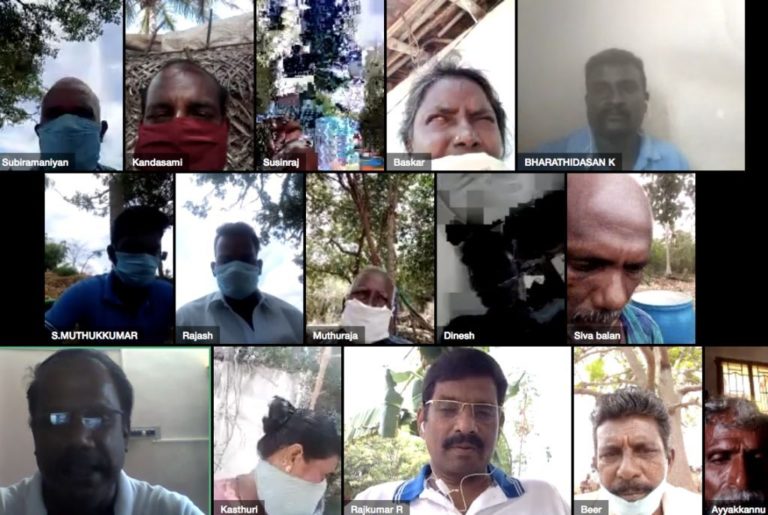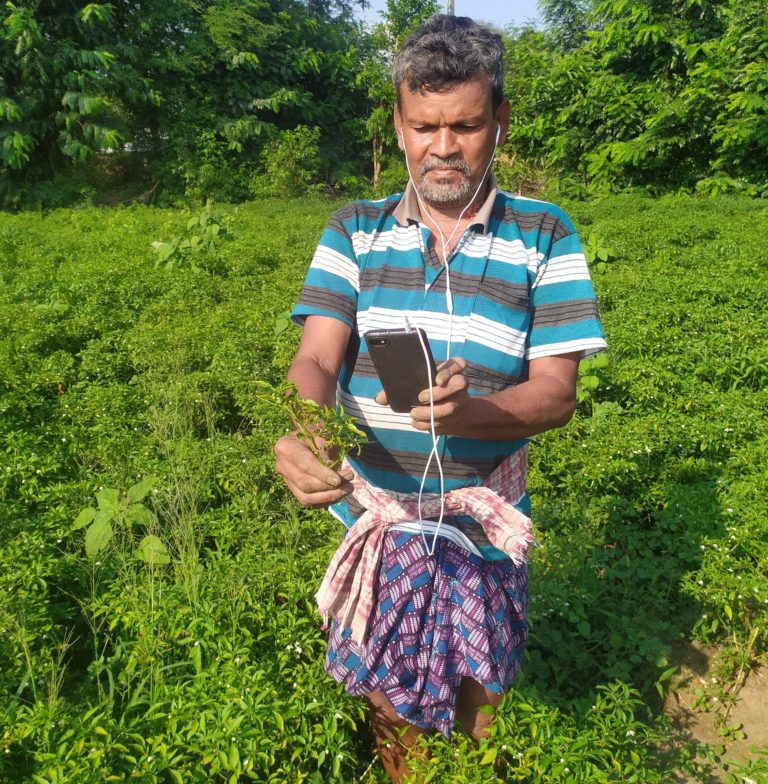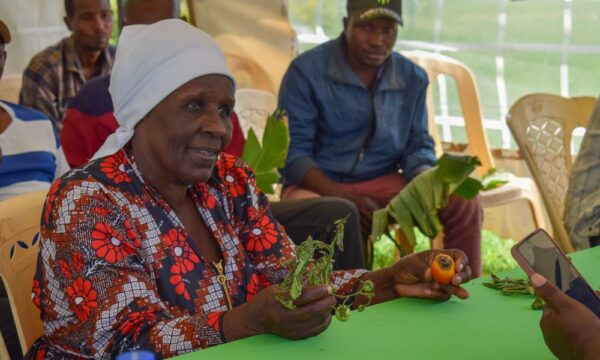This article was originally published in indigenus, a blog from Nature India
Rural communities grappling with livelihood issues and looking for support for farming activities are increasingly embracing technology for survival. Jayashree Balasubramanian, who heads communication at the M S Swaminathan Research Foundation (MSSRF) in Chennai, talks of her experience with farmers attending virtual ‘plant clinics’.

It’s a Friday morning and Lakshmi, a farmer who grows paddy, maize and finger millet in central Tamil Nadu, is peering into her phone camera adjusting the webinar settings. From behind her, the top of her toddler’s head pops up on the screen as she navigates her way around the virtual ‘plant clinic’. “I can’t hear you sir, please unmute yourself,” Laxmi says several times in Tamil before the expert on the other side heeds.
‘Unmute’, ‘webinar’, ‘share video’, ‘chat message’ – the Tamil conversation is peppered with these English phrases. The e-plant clinic session is one of the ways in which farmers are getting technical advice and support amidst the world’s largest lockdown that India imposed in the last week of March 2020 to check the spread of the novel coronavirus.
Soon, 39 other farmers crowd up every inch of her phone’s screen. Many of these farmers are holding samples of pests or diseases that have affected their plants. Two ‘plant doctors’ are advising them online in this three-hour session. Some farmers are in their picturesque farms with mobile phones ready to zoom into on-site problems they need advice on.
During the ongoing lockdown, a survey found 227 million internet users in rural India, 10 per cent more than urban India. The increased use of internet at this time is opportune for the rural community grappling with livelihood issues and looking for technical support for farming activities.
Global farming communities have long advocated the use of Information and Communication Technology (ICT) to empower farmers suggesting it may improve farmers’ livelihoods by as much as 500 per cent. The usual bottlenecks – lack of technology access, good connectivity, devices or capacity – suddenly seem to have eased under the pressure of the novel coronavirus crisis. The crucial need to connect is transforming how rural communities and holders of farming knowledge are working around these challenges.
For instance, the plant clinic which Laxmi sometimes attends alongside approximately 25 farmers every week, is rigged up in a physical venue and advertised beforehand so that farmers come prepared with their pest-disease affected plants to consult plant doctors. It also arms them against using any unscientific applications that may cause long-term damage to the soil or plants. A study by MSSRF found that e-clinics cost less than half of what a physical plant clinic would.

Even before the pandemic struck, farmers have been part of such efforts where support is provided on phone or social media. “During the lockdown, farmers started video-calling us, and we realised their need for visual connection and advice,” says Ramasamy Rajkumar, who coordinates efforts across 150 villages in India since 2012. The first webinar on 16 April 2020 saw 82 farmers joining in. “It meant that this was a format we should continue,” he says. While physical clinics build knowledge and capacity, the virtual clinics are building technology skill and mutual support.
Losses from pests or disease attacks can have a devastating effect on crops causing huge damage. The Food and Agriculture Organisation (FAO) estimates that pest attacks account for 40 per cent of all yield losses prompting the United Nations designate 2020 as the International Year of Plant Health.
Since the beginning of the lockdown, MSSRF has conducted five webinars in three states of India. They have not been without their fun moments. Farmer Kandasamy from Ramasamypuram, had multiple queries and also brought in a neighbouring farmer who had a volley of questions needing resolution. Subramanian, a farmer from Aayavayal helped himself merrily to a snack as he waited for his turn. Meanwhile, Muhammed Andakkulam altered his user name to ‘Beer’, to symbolically reflect reopening of liquor shops in his state of Tamil Nadu. The plant doctors patiently go through each query, sharing their recommendations in the chat box and promising support later on the phone.
Sometimes rural callers also glitch out but resurface miraculously and complete the call, to the envy of urban bandwith-squeezed callers. Most stay connected even after their query is answered, listening to other recommendations on a variety of crops from paddy to brinjal and black gram to coconut.
The farmers’ questions range from concerns over yellowing of groundnut leaves, discolouring of jasmine flowers, white-coloured pests on coconut tree leaves and withering of banana leaves. The common pests they report during the lockdown are whiteflies, thrips, aphids and green leafhoppers.
Purshothaman Senthilkumar, a plant doctor in the Pudukkottai district of Tamil Nadu, says the small farmers are facing issues in marketing their yields and report up to 40 per cent losses. “Those who did not have adequate labour to harvest have seen up to 20 per cent losses in the field,” he says. Seasonal pests and diseases have been compounded by shortage of labourers, maintenance, shop closures and non-availability of expert guidance.
E-plant clinics have not only been about technology and technical guidance, but also about moral support for the farming communities.
This article was originally published in indigenus, a blog from Nature India
1 Comment
Leave a Reply
Related News & Blogs
The ‘plant’ doctor will see you now
This blog was originally published on Good Food Movement Until five years ago, M. Muthulakshmi, a farmer from Thoppupatti village in Dindigul district, Tamil Nadu, relied heavily on chemicals, including banned antibiotics like streptomycin, for her pad…
4 February 2025





[…] https://blog.plantwise.org/2018/02/28/sri-lanka-launches-skype-service-to-further-strengthen-advisory-support-in-plant-clinics/ https://blog.plantwise.org/2020/05/13/spotted-coffee-grasshopper-in-bangladesh/ https://blog.plantwise.org/2020/06/25/lockdown-unlocking-technology-for-indias-farmers/ https://blog.plantwise.org/2020/05/20/pests-in-a-pandemic-india-plant-doctors-will-see-you-online-now/ […]